Since it began, SciCast has let you make conditional edits when we have previously linked the questions. But if you wanted to link questions, you had to email us. No more! Now users can add links.
Last Time on SciCast….
Forecasting a question with existing links looked like this:
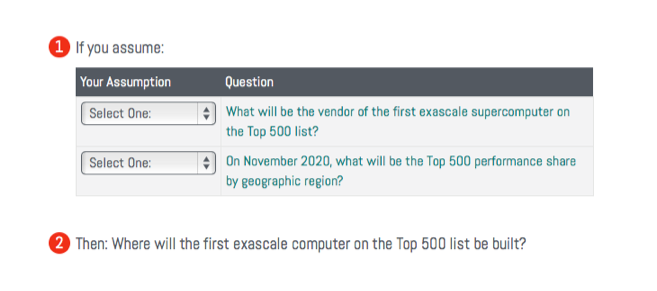 If you assumed that Cray would be the first exascale vendor, you could edit the conditional chances. Perhaps you had no real opinion about the overall chances, but strongly suspected that Cray would remain based in North America.
If you assumed that Cray would be the first exascale vendor, you could edit the conditional chances. Perhaps you had no real opinion about the overall chances, but strongly suspected that Cray would remain based in North America.
You still have that ability, plus more.
Now on SciCast: User-Added Links!
As of March 10, 2015, we have removed conditional edits from safe-mode, and enhanced their power in power-mode: users can now make their own links among existing questions. Suppose you thought this HPV question depended on the availability of other vaccines:
If you click “Add another assumption,” a dialog box pops up, allowing you to search and scroll to find the question you want to link. In this (silly) example I am going to link my forecast to the availability of an Ebola vaccine.
Clicking on the link for 556 temporarily attaches it to my target question. The bright yellow is a cue that you have to do something else to “make it stick.”
Use it or lose it! That bright yellow row is only a candidate link. To keep it, make an edit. Select an assumption, like “2015”:
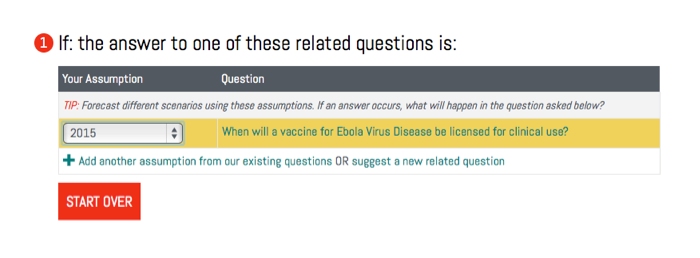 If you wish to start over, press the “Start Over” button. Otherwise proceed to make your conditional forecast.
If you wish to start over, press the “Start Over” button. Otherwise proceed to make your conditional forecast.
Here I have asserted the (unreasonable) opinion that the availability of an Ebola vaccine will make young women less likely to get HPV vaccinations.
But something is wrong – and not just with my reasoning. The “Submit” button is grayed out. The red text near the button says I have to make a bigger edit or my link won’t stick. I’ll explain why in a minute, but first let’s make the edit bigger.
OK, now I can submit the conditional forecast and receive the appropriate confirmation
If I click back on the Forecast tab, I can see that my link is now just an “ordinary” link that other people can use when forecasting this question.
 Maximize Your Points
Maximize Your Points
Remember, SciCast understands mutually exclusive assumptions and won’t charge you twice: your total charge for all conditional edits on a pair of questions equals the cost for the worst-case outcome. Therefore the points you invested assuming an Ebola vaccine in 2015 are available to re-use assuming 2016, or 2017. If you have no opinion in those scenarios, that’s fine, but if you do, you should express them.
Why Do We Require Minimum Trades?
We don’t want frivolous links. Links increase the computational load on the system, and if not managed would eventually swamp it. Therefore we “charge” for links by requiring you to invest in them. The more CPU cycles the link costs us, the bigger the trade we require to create it.
So if you’re linking two isolated binary questions, the minimum trade will be quite small. But if you’re adding the fourth 30-state flu question to an existing cluster, the minimum trade could be unaffordable.
Removing Links
If you see a correlation you think shouldn’t be there, you can edit the conditional probabilities to be more similar. This will reduce the strength of the link between them, and they will become less correlated.
Links that remain weak for some period of time will be culled. There are three reasons:
- We want the link structure to be a faithful independence-map of the real joint probability distribution – there is information in the graph!
- All links impose some computational cost now, even if unused.
- Existing links drive up the cost of future links. Weak links create an opportunity cost for stronger links.
Why Power Mode Only?
The requirement to make a minimum trade is not compatible with the safe-mode goal of eliciting beliefs. Rather than make two versions of the conditional edit panel, we decided it was better to simplify safe-mode to make it even easier for beginning forecasters, and those who wish quickly to provide their best estimates on marginal distributions.
Be Constructive
We’re placing a lot of power into our users’ hands. Please be thoughtful, and let us know about links that don’t seem to make any sense. Help us find the causal structure of the world.
Users who have LIKED this post:


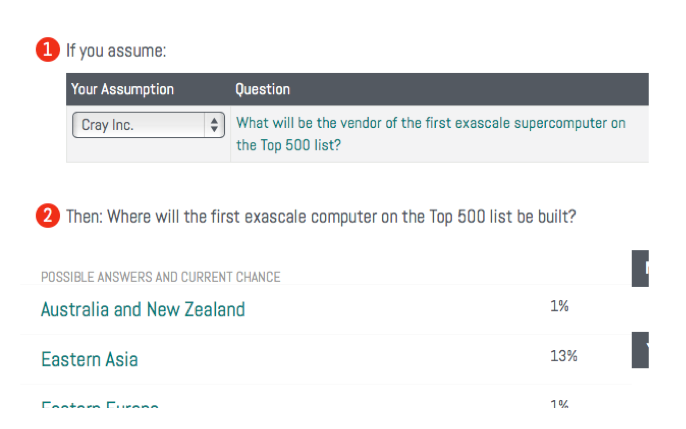

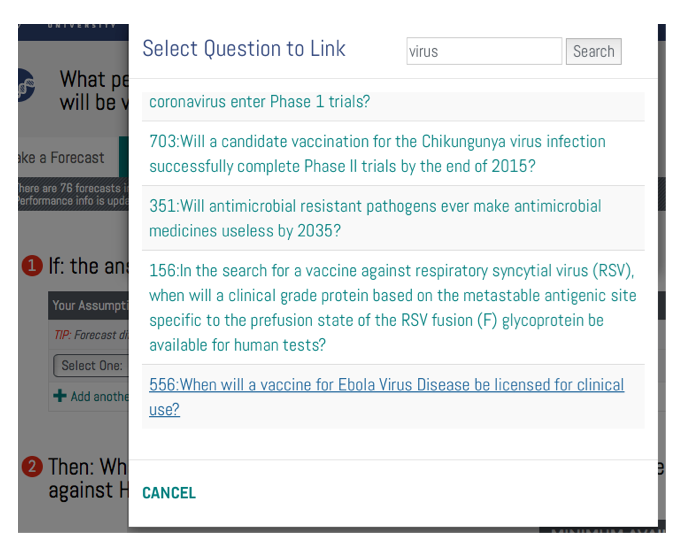
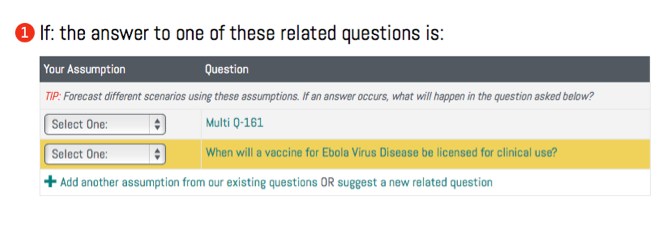

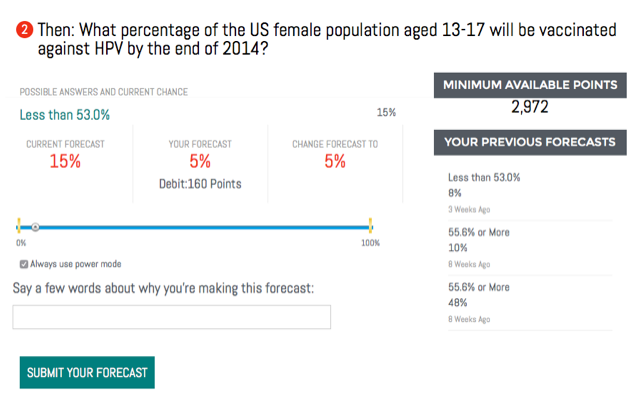
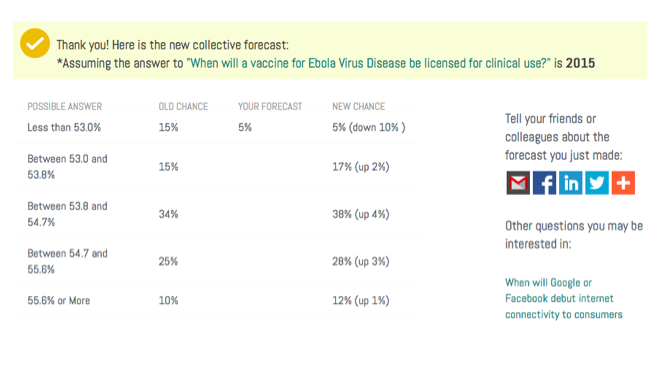
Very cool. Note to users: you may have to clear your cache for this functionality to show up. I just used it to link 629 and 721.
Users who have LIKED this comment:
Off topic, this system illustrates what may be a nascent trend that I think is interesting. As distributed systems become more common, perhaps we’ll see more cases where the tradeoff between allowing users flexibility in the use of those systems and avoiding undue computational burdens (either to central servers or to the users themselves in a system with decentralized computation) is made “economically explicit”. Here, for example, a minimum trade size is used, although it could just as well be a flat fee in points. In the “Bitcoin 2.0″ currency called Ethereum, which supports decentralized computation on the blockchain itself to enforce a form of smart contracts, a fee called “gas” is charged in direct proportion to the demands of the computations that a contract requires be performed by the network.
Users who have LIKED this comment:
Pingback: Combo Edits Q & A | The Official SciCast Blog
Pingback: Updates to the Combo Edits Contest! | The Official SciCast Blog